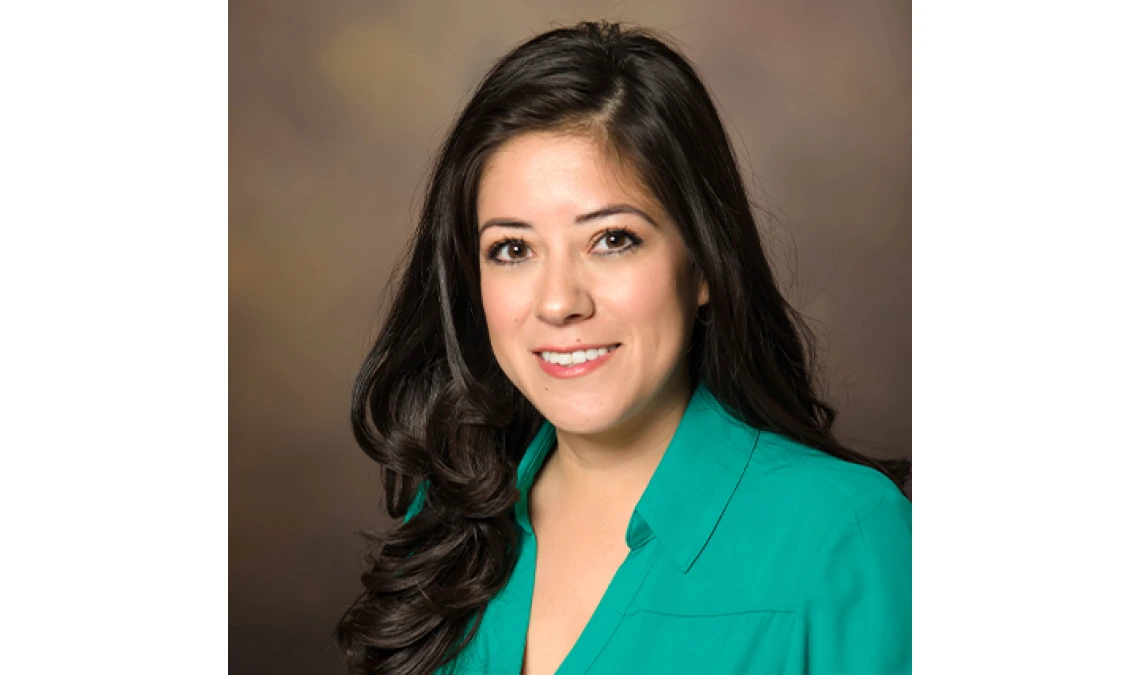Cancer Center Postdoctoral Research Fellow Named Woman of the Year
Dr. Felina Cordova-Marks was named 2020 Woman of the Year, an honor presented at the “40 Under 40” virtual awards, sponsored by the Tucson Hispanic Chamber of Commerce and the Arizona Daily Star.

Felina Cordova-Marks, DrPH, MPH, a second-year postdoctoral research fellow at the University of Arizona Cancer Center, received the 2020 Woman of the Year honor presented Tuesday at the “40 Under 40” virtual awards, sponsored by the Tucson Hispanic Chamber of Commerce and the Arizona Daily Star. She was one of 40 men and women recognized for their demonstrated leadership and community impact.
FCM WOTY.jpg
 Felina Cordova-Marks, DrPH, MPH, with her Woman of the Year award.
Felina Cordova-Marks, DrPH, MPH, with her Woman of the Year award. “I am very grateful for this honor,” Cordova-Marks said. “I have always wanted to use my skills to help my community, and I am proud that this award reflects the work that I and many others have been doing to help during a difficult time.”
A member of the Hopi tribe and also of Hispanic heritage, Dr. Cordova-Marks has been instrumental in assisting underserved populations during the COVID-19 pandemic. She is the Founder/lead organizer of the Southern Arizona Urban, Native and Indigenous COVID-19 Relief fundraising and outreach efforts. To date, the organization has raised more than $30,000 through direct donations and a GoFundMe account. She also has organized mask drives for the Hopi tribe and Gallup Indian Medical Center.
As a cancer researcher, Dr. Cordova-Marks is part of the NCI-funded training grant. The T32 Cancer Prevention and Control Health Disparities Training Program is led by co-principal investigators Robin B. Harris, PhD, and Cynthia A. Thomson, PhD. Dr. Cordova-Marks has been focusing her efforts on urban American Indian caregiving, which studies people that are providing care for a family member with cancer, chronic disease, disability or the elderly in an urban setting.
Harris_Robin201000861_007.jpg
 Robin Harris, PhD
Robin Harris, PhD "She has an exceptional passion for public service," Dr. Harris said. "You rarely see someone who manages to be so successful in academia and in serving her community at the same time. It takes incredible organization, and I think this is what makes her so uniquely capable of doing so much."
In March, Dr. Cordova-Marks pivoted her research focus from cancer to instead study caregiving during the COVID-19 pandemic. She has worked closely with Dr. Harris and another mentor, Terry A. Badger, PhD, to meet via secure Zoom to discuss with American Indian caregivers what their experiences have been during the pandemic. Areas of interest have been the general needs, challenges, stress and overall health of caregivers. They expect to publish their research in early 2021 in a special COVID edition of the American Indian Culture and Research Journal, published by the American Indian Studies Center at the University of California, Los Angeles.
201204549-badger-terry-3817.jpg
 Terry Badger, PhD
Terry Badger, PhD “We hope our research helps tribes and organizations so that they can better support their caregivers and make any necessary changes to their caregiving programs during the ongoing pandemic,” Dr. Cordova-Marks said.
“Her research approach is very much community and participatory-based,” Dr. Badger said. “She engages in dialogue with her community to understand what is most important to them. She exemplifies how a researcher can be a true partner with their community.”
Dr. Cordova-Marks is also serving as the director of community engagement for the Arizona CoVHORT, a multiyear research study seeking to answer questions about risk factors for severe COVID-19 infection and how the virus impacts long-term health outcomes.
She has been involved in various projects at the UArizona Cancer Center dating back to her undergraduate studies. As part of her participation in the Partnership for Native American Cancer Prevention (NACP), she worked in the lab of then-Director, David S. Alberts, MD. Later, she worked in the phase I cancer clinical trials program with Dr Daruka Mahadevan and she received Cancer Center funding for her doctoral dissertation with Hopi cancer survivors and their caregivers.
fcm Award.jpg
 Woman of the Year award.
Woman of the Year award. “The Cancer Center has always been a big supporter of me,” Dr. Cordova-Marks said. “I have learned so much from my mentors, both in the past and current, and I am thankful to each of them. I am fortunate to be here in a position where I can use my skills to help people.”
A native of Flagstaff, Ariz., Dr. Cordova-Marks holds three degrees from the UArizona, including a bachelor’s degree in microbiology, along with both master’s and doctoral degrees in public health. She is a published author on topics such as cancer, cardiology, informal health caregiving and American Indian health. Additionally, she is the recipient of the National Native American 40 Under 40 Award, and the UArizona Centennial Award.
“Being named the Woman of the Year is a very prestigious honor that highlights her unique qualities,” said Dr. Badger. “It shows she is both very successful as a community advocate and in academia. She is going to have a very successful career wherever her path goes beyond her postdoctoral work.”
Dr. Cordova-Marks has been volunteering with various organizations in Tucson for over 20 years. To increase volunteerism and volunteer visibility both nationally and locally, she founded Indigenous Volunteers and Tucson Volunteers. She also serves as a mentor to undergraduate and graduate American Indian students.
“I don’t think she does all that she does for people simply because she can do it,” Dr. Harris said. “I think she does it because she feels she has to do it. It’s personal to her. She feels she has to make a difference.”



